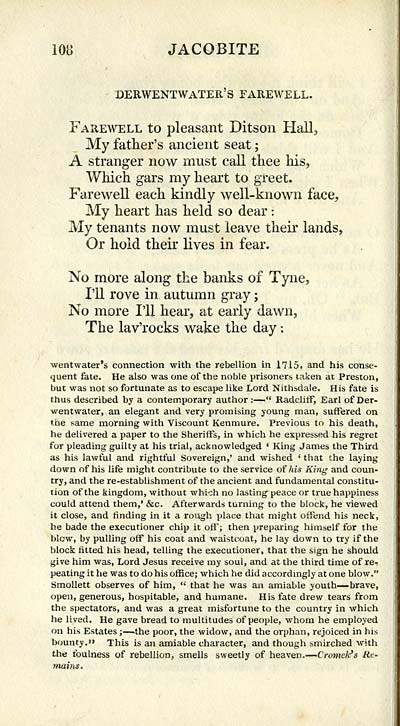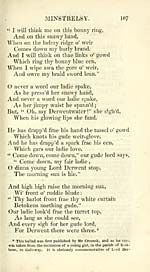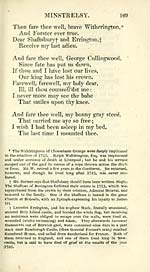Glen Collection of printed music > Printed text > Jacobite minstrelsy
(130) Page 108 - Derwentwater's farewell
Download files
Complete book:
Individual page:
Thumbnail gallery: Grid view | List view

108 JACOBITE
DERWENTWATER S FAREWELL.
Farewell to pleasant Ditson Hall,
My father's ancient seat ;
A stranger now must call thee his,
Which gars my heart to greet.
Farewell each kindly well-known face,
My heart has held so dear :
My tenants now must leave their lands,
Or hold their lives in fear.
No more along the banks of Tyne,
I'll rove in autumn gray ;
No more I'll hear, at early dawn,
The lav'rocks wake the day :
wentwater's connection with the rebellion in 1715, and his conse-
quent fate. He also was one of the noble prisoners taken at Preston,
but was not so fortunate as to escape like Lord Nithsdale. His fate is
thus described by a contemporary author :— " Radcliff, Earl of Der-
wentwater, an elegant and very promising young man, suffered on
the same morning with Viscount Kenmure. Previous to his death,
he delivered a paper to the Sheriffs, in which he expressed his regret
for pleading guilty at his trial, acknowledged ' King James the Third
as his lawful and rightful Sovereign,' and wished ' that the laying
down of his life might contribute to the service of his King and coun-
try, and the re-establishment of the ancient and fundamental constitu-
tion of the kingdom, without which no lasting peace or true happiness
could attend them,' &c. Afterwards turning to the block, he viewed
it close, and finding in it a rough place that might offend his neck,
he bade the executioner chip it off'; then preparing himself for the
blew, by pulling off his coat and waistcoat, he lay down to try if the
block fitted his head, telling the executioner, that the sign he should
give him was, Lord Jesus receive my soul, and at the third time of re-
peating it he was to do his office; which he did accordingly at one blow."
Smollett observes of him, '•' that he was an amiable youth— brave,
open, generous, hospitable, and humane. His fate drew tears from
the spectators, and was a great misfortune to the country in which
he lived. He gave bread to multitudes of people, whom he employed
on his Estates ; — the poor, the widow, and the orphan, rejoiced in his
bounty." This is an amiable character, and though smirched with
the foulness of rebellion, smells sweetly of heaven.— Cromek's Re-
mains.
DERWENTWATER S FAREWELL.
Farewell to pleasant Ditson Hall,
My father's ancient seat ;
A stranger now must call thee his,
Which gars my heart to greet.
Farewell each kindly well-known face,
My heart has held so dear :
My tenants now must leave their lands,
Or hold their lives in fear.
No more along the banks of Tyne,
I'll rove in autumn gray ;
No more I'll hear, at early dawn,
The lav'rocks wake the day :
wentwater's connection with the rebellion in 1715, and his conse-
quent fate. He also was one of the noble prisoners taken at Preston,
but was not so fortunate as to escape like Lord Nithsdale. His fate is
thus described by a contemporary author :— " Radcliff, Earl of Der-
wentwater, an elegant and very promising young man, suffered on
the same morning with Viscount Kenmure. Previous to his death,
he delivered a paper to the Sheriffs, in which he expressed his regret
for pleading guilty at his trial, acknowledged ' King James the Third
as his lawful and rightful Sovereign,' and wished ' that the laying
down of his life might contribute to the service of his King and coun-
try, and the re-establishment of the ancient and fundamental constitu-
tion of the kingdom, without which no lasting peace or true happiness
could attend them,' &c. Afterwards turning to the block, he viewed
it close, and finding in it a rough place that might offend his neck,
he bade the executioner chip it off'; then preparing himself for the
blew, by pulling off his coat and waistcoat, he lay down to try if the
block fitted his head, telling the executioner, that the sign he should
give him was, Lord Jesus receive my soul, and at the third time of re-
peating it he was to do his office; which he did accordingly at one blow."
Smollett observes of him, '•' that he was an amiable youth— brave,
open, generous, hospitable, and humane. His fate drew tears from
the spectators, and was a great misfortune to the country in which
he lived. He gave bread to multitudes of people, whom he employed
on his Estates ; — the poor, the widow, and the orphan, rejoiced in his
bounty." This is an amiable character, and though smirched with
the foulness of rebellion, smells sweetly of heaven.— Cromek's Re-
mains.
Set display mode to: Large image | Transcription
Images and transcriptions on this page, including medium image downloads, may be used under the Creative Commons Attribution 4.0 International Licence unless otherwise stated. ![]()
| Special collections of printed music > Glen Collection of printed music > Printed text > Jacobite minstrelsy > (130) Page 108 - Derwentwater's farewell |
|---|
| Permanent URL | https://digital.nls.uk/87927399 |
|---|
| Description | Scottish songs and music of the 18th and early 19th centuries, including music for the Highland bagpipe. These are selected items from the collection of John Glen (1833 to 1904). Also includes a few manuscripts, some treatises, and other books on the subject. |
|---|
| Description | The Glen Collection and the Inglis Collection represent mainly 18th and 19th century Scottish music, including Scottish songs. The collections of Berlioz and Verdi collected by bibliographer Cecil Hopkinson contain contemporary and later editions of the works of the two composers Berlioz and Verdi. |
|---|

